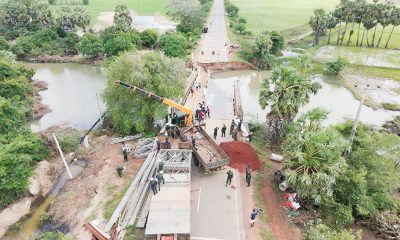Editorial
The Kabul quandary

Thursday 9th September, 2021
Afghanistan now has an interim government of the Taliban by the Taliban for the Taliban; it is an all-male administration sans any inclusiveness. Even the Taliban groups considered moderate and politically pragmatic have been left out. Worse, 17 out of the 33 Cabinet ministers are reportedly on the UN sanction list; Interior Minister Sirajuddin Haqqani and his uncle, Rehman Haqqani, who is the Minister for Refugees, are on the FBI’s list of most wanted terrorists. Sirajuddin has a 10-million-dolloar bounty on his head! According to Afghanistan’s Ambassador and Permanent Representative to the UN, Ghulam Isaczai, those on the UN sanction list include interim Prime Minister, two Deputy PMs, and ministers of Interior, Defence and Foreign Affairs.
The composition of the caretaker government gives a foretaste of what the future holds for Afghanistan. However, thankfully, a discernible change has apparently come over the Taliban, compared to what they were before their ouster in 2001. They seem somewhat tolerant of dissent if their reaction to protests against their rule, in some parts of the country, is any indication. Before the fall of Kabul, it was thought that the Taliban would wipe out their opponents the way they had done in the past. What was feared has not come to pass. But there is no guarantee that the Taliban will not revert to their old ways. Hence the need for the international community to engage them in talks and promote democratic change while granting aid. There is no other way to help the ordinary Afghans crying out for help. A violent group, whose members have been brought up on a diet of religious extremism from birth, and trained to kill, cannot be expected to mend its ways overnight.
The Taliban are now dependent on mainstream and social media for their propaganda. This is in sharp contrast to what they did during their previous rule from 1996 to 2001; they banned television and entertainment, and there was no media worth speaking of, in Afghanistan, at the time. They went so far as to search and destroy television sets so much so that they came to be dubbed ‘Teleban’. Today, media outlets have been allowed to operate and women are seen moving about unaccompanied and using mobile phones in public. This may be considered a positive impact the 20-year hiatus in the Taliban rule has had on the Afghan society.
The western nations that have taken upon themselves the burden of defending human rights and democracy across the world and even do not hesitate to bomb developing countries back into the Stone Age to ‘protect democracy’ find themselves in a dilemma. They will have to deal with Afghanistan’s caretaker government with ministers they consider terrorists and have even offered bounties for. China has indicated its willingness to work with the Taliban regime, and the US, the UK, the EU and their allies will be compelled to soften their stand on Afghanistan as China’s involvement in that country is a worrisome proportion for them. The western powers, it bears recall, did likewise in Africa, where they first cut off aid to several nations, citing human rights violations as the reason. China moved in with aid, and the West followed suit, throwing their human rights concerns out of the window.
The irony of having to deal with the interim Taliban government while campaigning for setting up war crimes tribunals elsewhere could not be starker for the US and its western allies. China is reported to have called for a probe into the war crimes committed by the US and the coalition forces in Afghanistan. On 24 August, Chinese envoy Chen Xu told the UNHRC that the US army and the militaries of the coalition forces had to be held accountable for human rights violations in Afghanistan. He said: “The US, the UK, Australia and other countries must be held accountable for the violation of human rights committed by their militaries in Afghanistan and the current session should cover this issue.”
Now that the Taliban have formed a government and their leaders have come out of hiding, the UNHRC should be able to heed China’s request and order a probe. The onus is on the UNHRC members concerned about the human rights violations in Afghanistan to move a resolution for a war crimes probe there, and request the US to co-sponsor it and lead by example.
Editorial
Desperate political sandbagging

Friday 26th December, 2025
There is nothing more predictable than surprise in politics. After securing a two-thirds majority in Parliament last year and emerging victorious in most local councils, this year, the JVP-led NPP may have thought that it was plain sailing. But the government now has many unforeseen, seemingly intractable issues to contend with almost on all fronts. The disaster-stricken economy is expected to slow down, with relief and rebuilding costs escalating, and the deadline for the resumption of debt repayment approaching. Vehicle imports are bound to decrease, causing a sharp drop in the government’s tax revenue. The rupee is depreciating fast. As if these were not enough, the government is experiencing serious problems on the political front.
The defeat of the NPP’s budget in the Colombo Municipal Council (CMC), which the JVP/NPP seized control of through extensive horse trading, could not have come at a worse time for the government. The same fate has befallen many other NPP-controlled local councils. Most of all, the NPP has suffered a string of defeats in the cooperative society elections countrywide during the last several months.
Desperate times are said to call for desperate measures. Cyclone Ditwah and the attendant extreme weather events that badly damaged roads, tank bunds and river banks prompted repair teams to resort to sandbag revetment. But there have been many instances where sandbag facings collapsed, unable to withstand the intensity of floods and slope failures. The government politicians who boasted of having carried out swift restoration work have been left red-faced; they have failed to assess the severity of the problems they are trying to solve.
The NPP government has resorted to a method similar to sandbag revetment in a desperate bid to consolidate its control over some local councils which cannot secure the passage of their budgets for want of majorities. Its members have gone to the extent of setting the clock forward in such institutions, meeting in advance of the regular start time and declaring their budgets passed before the arrival of the Opposition councillors. What the NPP did in the Horana Urban Council the other day is a case in point, the Opposition says.
The NPP is accused of having inflated the number of votes for its Galle MC budget amidst a howl of protests from the Opposition and declared victory. The Opposition councillors prevented the council secretary from leaving the auditorium, put the budget to a fresh vote and defeated it. The Opposition has threatened legal action against the Mayors/Chairpersons and the state officials for violating the law. The government is likely to employ a similar method to have the CMC budget passed when it is put to a vote again next week. The JVP has no sense of shame, just like all other political parties that have been in power.
All self-righteous politicians, given to moral grandstanding, lay bare their true faces when their interests are threatened, and they face the prospect of losing their hold on power. The JVP/NPP is now without any right to be critical of its rivals who did not scruple to undermine democratic principles and traditions to retain power.
Gaining control of hung local councils is one thing, but running them to the satisfaction of their members and the public is quite another. The non-majority councils that the Opposition parties have gained control of could face the same fate as the CMC. This situation has come about because the country is without patriotic leaders. Ideally, the political parties that obtained pluralities in the hung councils should have been allowed to control those institutions, and they should have adopted a conciliatory approach and sought their political rivals’ cooperation to serve the public.
The shameful manner in which the NPP acted during the Galle MC budget vote is not unprecedented. One may recall that in January 2024, the SLPP-UNP government did something similar to secure the passage of its despicable Online Safety Bill. The then Speaker Mahinda Yapa Abeywardena stooped so low as to make use of a brawl in the House and declare the Bill passed. Interestingly, the SLPP and the UNP are among those who are raking the NPP over the coals for undermining democratic principles and traditions. So much for the self-proclaimed messiahs and their critics.
Editorial
Christmas spirit, relief and pledges

Thursday 25th December, 2025
Christmas has dawned while Sri Lanka is reeling from the cumulative impact of multiple disasters which snuffed out hundreds of lives and destroyed many homes and livelihoods. It is a time of hope. Its ethos, which emphasises hope, compassion and giving, could not be more relevant in these difficult times when the task of looking after a large number of disaster victims and helping rebuild their shattered lives has become a top national priority.
Santa came here the other day, as it were. There was no magical flight of a sleigh pulled by reindeer across the night sky. Instead, a jet landed at the BIA, and out stepped Indian External Affairs Minister S. Jaishankar. He unveiled a generous disaster relief and reconstruction package from India and flew back. This noble act of giving exemplifies the spirit of Christmas as much as good neighbourliness.
The best way the Sri Lankan rulers can show appreciation for generous assistance from India and other nations is to uphold accountability, rationalise disaster relief and ensure that it is distributed in a transparent manner. There are disturbing reports about political interference with the disbursement of funds among disaster victims. A high-level probe must be conducted into these allegations.
Christmas is also the season of giving and forgiving. The irony of Minister Jaishankar meeting President Anura Kumara Dissanayake, who is also the leader of the JVP, may not have been lost on keen political observers. If the JVP had acted wisely, heeding religious tenets, and pursued its political goals without resorting to violence, in the late 1980s, tens of thousands of precious lives and state assets worth billions of rupees could have been spared. India has forgiven the JVP, which it even helped gain international legitimacy and shore up its electoral chances in the run-up to last year’s presidential election. India has also helped Sri Lanka manage its worst-ever economic crisis and the impact of natural disasters. The people of Sri Lanka have also forgiven the JVP, despite its past violence, as evident from its impressive electoral victories last year. Sadly, the JVP is not willing to forgive its political enemies. Its General Secretary Tilvin Silva himself has said so. It ought to soften its stand.
All political leaders in this country usually issue well-written Christmas messages, extolling the core Christian virtues, such as giving, forgiving, compassion and peace-making. If only they lived up to the ideals they claim to cherish, at least while the country is struggling to recover from a series of natural disasters. Unfortunately, their post-disaster political battles are intensifying apace, and one wonders whether their focus is actually on helping disaster victims or furthering their political interests. They are not willing to sink their political differences for the sake of the disaster victims crying out for relief.
Meanwhile, the government leaders ought to go beyond issuing Christmas messages if they are to prove that they actually care about the believers in Jesus Christ. They ought to fulfil their pledge to serve justice for the victims of the Easter Sunday terror attacks (2019), which claimed more than 275 lives.
About seven years have elapsed since that tragedy which could have been prevented if the then government had heeded intelligence warnings, and the country has had four Presidents and three governments. But the promises made by the political leaders to bring the masterminds behind the Easter Sunday carnage to justice have gone unfulfilled. Those who are desperately seeking justice pinned their hopes on the current leaders who vowed to trace and prosecute the terror masterminds expeditiously.
The present-day leaders, too, have chosen to remain silent on their promise at issue; they are impervious to calls for justice, just like their predecessors. Let fulfilling their pledge to serve justice for the Easter Sunday terror victims be one of their Christmas resolutions.
Editorial
Time to pursue climate relief more vigorously

Wednesday 24th December, 2025
Climate change has upended long-held theories about cyclones in the equatorial regions, and Sri Lanka, which was once considered reasonably safe from such severe weather phenomena, is becoming increasingly vulnerable, as evident from the devastating impact of Cyclone Ditwah. All signs are that the worst is yet to come, and the need for a multi-pronged national strategy to prepare the country to face future natural disasters linked to climate change cannot be overstated.
The government of Sri Lanka has been in overdrive, seeking assistance from the international community for its post-Ditwah rebuilding programmes. The World Bank has estimated the losses caused by the recent disasters at USD 4.1 billion. Foreign assistance is coming, but in dribs and drabs. There have also been loans for rebuilding, but such borrowing is bound to make the country’s efforts to achieve debt sustainability even more uphill. This has caused much concern to international experts.
A group of internationally renowned economists, including Nobel Laureate Joseph Stiglitz, has called for the “immediate suspension of Sri Lanka’s external sovereign debt payments, and a new restructuring that restores debt sustainability under the new circumstances”. Other members of the group of eminent economists urging the international community to help Sri Lanka are Jayati Ghosh, Thomas Piketty, Martín Guzmán and Kate Raworth. They have said: “This environmental emergency is poised to absorb – and potentially exceed – the extremely limited fiscal space created by the current debt restructuring package. Additional external debt is already being obtained from the IMF, and more lending to deal with the impacts of the disaster is likely.” These economists deserve praise for their concern for a disaster-stricken nation mired in debt, but whether international creditors will take a sympathetic view of Sri Lanka’s predicament and agree to another round of debt restructuring is in doubt.
Another debt default is something Sri Lanka needs like a hole in the head. Hence the need to explore other avenues to raise finance for rebuilding.
Leader of the United Republic Front and former Cabinet Minister Patali Champika Ranawaka argued in an interview with Derana TV on Monday night that Sri Lanka should leverage its situation as a victim of climate change to gain access to international climate financing to cover at least part of the cost of post-disaster rebuilding, instead of depending on loans. He said that obtaining such climate relief should be part of Sri Lanka’s recovery strategy, and some debt relief should be sought from the carbon-polluting industrialised nations among its creditors.
There is a growing corpus of literature about the pathways vulnerable states can use to seek climate aid. The countries affected by climate change can gain access to international aid and relief through established climate finance mechanisms, humanitarian channels, and multilateral institutions. A dedicated Loss and Damage Fund is now in place to channel resources to vulnerable nations. There have been instances where some vulnerable nations, especially those of the organisations, such as the Small Island Developing States (SIDS), have successfully accessed international climate change finance, relief and legal avenues for support. Tuvalu became one of the first Pacific island nations to access climate finance from the Green Climate Fund. However, UN reports show that SIDS still receive only a fraction of international climate finance relative to their vulnerability. There’s the rub.
Another method the victim nations can adopt to raise funds is ‘innovate finance’, which has been defined as “creative use of financial markets and partnerships with international finance institutions to support adaptation and resilience in a climate-vulnerable nation”.
What Ranawaka has proposed by way of easing the country’s rebuilding burden to some extent deserves serious consideration. It is hoped that the government will take such views on board at this crucial juncture.
-

 News3 days ago
News3 days agoMembers of Lankan Community in Washington D.C. donates to ‘Rebuilding Sri Lanka’ Flood Relief Fund
-

 Latest News6 days ago
Latest News6 days agoLandslide early warnings issued to the districts of Badulla, Kandy, Kurunegala, Matale and Nuwara-Eliya extended till 8AM on Sunday (21)
-

 News4 days ago
News4 days agoAir quality deteriorating in Sri Lanka
-

 Business5 days ago
Business5 days agoBrowns Investments sells luxury Maldivian resort for USD 57.5 mn.
-

 Editorial6 days ago
Editorial6 days agoCops as whipping boys?
-

 Latest News7 days ago
Latest News7 days agoLandslide early warnings issued to the Districts of Badulla, Kandy, Kurunegala, Matale and Nuwara Eliya extended
-

 News4 days ago
News4 days agoCardinal urges govt. not to weaken key socio-cultural institutions
-

 Features5 days ago
Features5 days agoAnother Christmas, Another Disaster, Another Recovery Mountain to Climb













